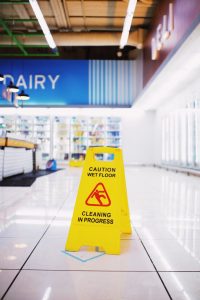Falls are one of the most common causes of serious injury in the U.S. About 8 million people are treated in hospital emergency rooms annually due to falls, and approximately 12 percent of those are slip-and-fall accidents. 
You may be aware that if you’re injured in a South Florida slip-and-fall accident that you may have grounds to pursue a premises liability claim against the property owner for your injuries. But what if there was a sign indicating the floor was wet?
As our Fort Lauderdale injury lawyers can explain, there is no hard-and-fast rule about when business owners or property managers are required to post a sign indicating the floor is wet. That said, lack of a wet floor sign where the floor was, indeed, wet can be evidence that the business failed to provide guests with adequate warning of a dangerous condition when they had a duty to do so. This an form the basis of a negligence claim.
However, the presence of a wet floor sign in the area where you slipped and fell doesn’t necessarily mean you can’t recover damages. It’s going to depend on the totality of the circumstances. Having successfully pursued many South Florida premises liability claims stemming from slip-and-fall accidents, we recognize these cases are often more complex than they might appear initially. The outcome of these cases depends largely on the totality of the evidence, and a wet floor sign is just one piece of that puzzle.
Florida Law on Slip-and-Fall Accidents
The foundation of most Florida slip-and-fall cases is going to be general negligence theory. This is when someone has a legal duty to someone else, breaches that duty, and the result is an injury for the person hurt can be financially compensated. Slip-and-fall cases are a type of negligence case called premises liability. Premises liability statutes and case law aim to protect those who are hurt on another’s property due to the wrongdoing or carelessness of the owner or controller of that property.
Property owners have a legal duty of care to protect lawful guests from dangerous conditions on site, particularly when the guest is a member of the public invited for the financial benefit of the property owner. (Typical examples would be hotels, grocery stores, concert venues, home goods retailers, etc.) Dangerous conditions can include slippery floors that may cause a slip-and-fall accident.
Per F.S. 768.0755, which pertains to cases involving “transitory foreign substances” at places of business, the burden of proof rests on the person who was hurt to show the property owner had actual or constructive knowledge of the hazard and should have taken some action to address it or warn about it before someone was hurt. Actual knowledge is typically proven if the property owner created the dangerous condition (i.e., a staffer spilled liquid on the floor and failed to clean it up right away). Constructive knowledge requires circumstantial evidence showing the condition had existed for a long enough time it should have been found OR the condition was foreseeable because it happened with regularity.
Wet floor signage can be an inexpensive and sometimes effective way for businesses to warn patrons of a slippery floor that can cause a fall. That said, they aren’t strictly required. They also don’t establish immunity for liability. The key question will be whether that warning was effective. For example, if the sign was placed in an obscure location or significantly faded, the warning it was trying to convey may not be considered “adequate.” If that’s the case, it’s presence might help your case by showing the property owner was definitely aware of the dangerous condition, but failed to provide adequate warning.
Even if a court finds you held some degree of responsibility for not heeding a wet floor sign, the state follows a system of strict comparative negligence. That means you might see your damages reduced, but you won’t be entirely deprived of the opportunity to collect compensation unless you were 100 percent liable for your own injury.
If you have questions about whether you have a viable South Florida slip-and-fall accident claim, we can help.
Call Fort Lauderdale Injury Attorney Richard Ansara at (954) 761-4011. Serving Broward, Miami-Dade and Palm Beach counties.
Additional Resources:
F.S. 768.81, Florida Comparative Fault Law
 Broward Injury Lawyer Blog
Broward Injury Lawyer Blog



